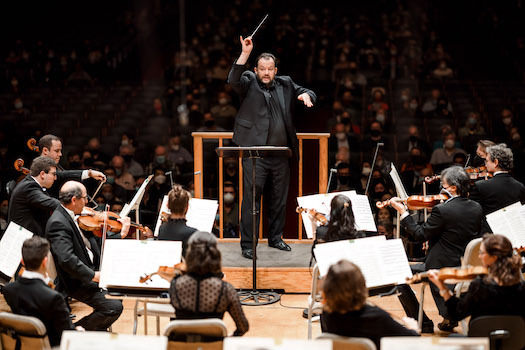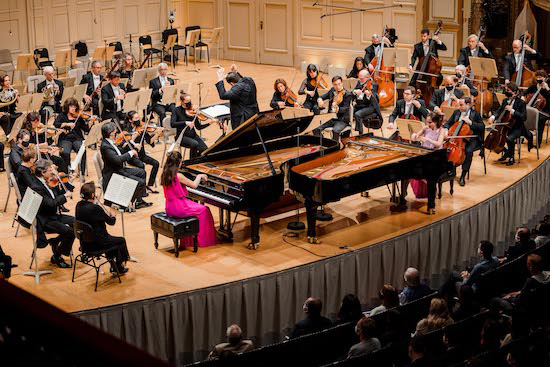Strauss, from spiritual to carnal, and Mozart for two with Nelsons and BSO
Like the composer’s other, more self-indulgent tone poems, Death and Transfiguration is rich in musical imagery. The work’s sections, played without pause, reflect the dying man’s agonized state and his terror at death as he clings to comforting memories. Yet it all culminates in a moment of almost Mahlerian serenity as the man’s soul enters eternity.
Nelsons’ detailed reading revealed every shade of anguish and resolve in this end-of-life struggle. Lingering tempos in the opening section allowed for the woodwind and string phrases to flower. Light timpani strokes lent a quiet tension, and John Ferrillo’s oboe line floated over a soft accompaniment that gave way to flute and violin solos evoking memories of better days.
The orchestra brass brought a bold resonance to the stormier sections where Strauss’s protagonist wrestles over the very purpose of life. String and wind figures coursed with intensity. The transfiguration theme — heard first in fragments — churned in the cellos, finding little resolution at first. It was fully realized in the concluding passages through shimmering strings and brass that conveyed repose and an acceptance of eternal peace.
The Love Scene from Strauss’ Feuersnot, which opened the concert, offered a life-affirming contrast and a somewhat different route to epic, out-of-body transcendence, along with a reminder that certain Strauss works retain their capacity to shock.
Shrugging off high-minded Wagnerian ideals of redemptive love, Feuersnot proffers sex as the key to reigniting the protagonist’s creative spark. The Love Scene between the sorcerer Kunrad and the virgin Diemut used to be a popular concert item. In the BSO’s first performance of the work since 1911, Nelsons delivered a sensuous reading that left little to the imagination. Here, too, his slow tempo allowed the music to build tension plausibly as the woodwinds flared and the brass boomed ecstatically. Strauss, the performance suggested, was a master of delayed gratification.
The second half of the concert belonged to Mozart’s Concerto in E-flat for two pianos and orchestra, with a late replacement for Dutch brothers Lucas and Arthur Jussen, whose travel visa woes continue. (The Jussens canceled Tanglewood appearances this past summer for the same reason.)
In their place on Thursday were twin sisters Christina and Michelle Naughton, in what proved to be a spectacular BSO debut.
Mozart’s concerto — likely written for the composer to play with his own sister — was an ideal vehicle for the Philadelphia-born siblings, who played with a fire and precision matched by a remarkable cohesiveness that enabled phrases from one to pass imperceptibly to the other.
Their performance of Mozart’s blazing lyrical score exuded both humor and exuberance. Delicate finger work allowed for their lines to sound crisp and buoyant in the opening Allegro. The concluding Rondo was just as elegant, the pianists tossing off the running scales and arpeggios with sensitivity and assurance.
The heart of the concerto is the Andante, which the duo rendered with searching lyricism. Playing with pearly tone, the Naughtons melded their phrases with the warm accompaniment woven by Nelsons in response. The sisters complemented their graceful performance with a ferocious encore of “Boogie” from Paul Schoenfield’s Five Days of a Manic-Depressive.
The program will be repeated 1:30 p.m. Friday and 8 p.m. Saturday and Tuesday at Symphony Hall. bso.org; 888-266-1200
Posted in Performances





